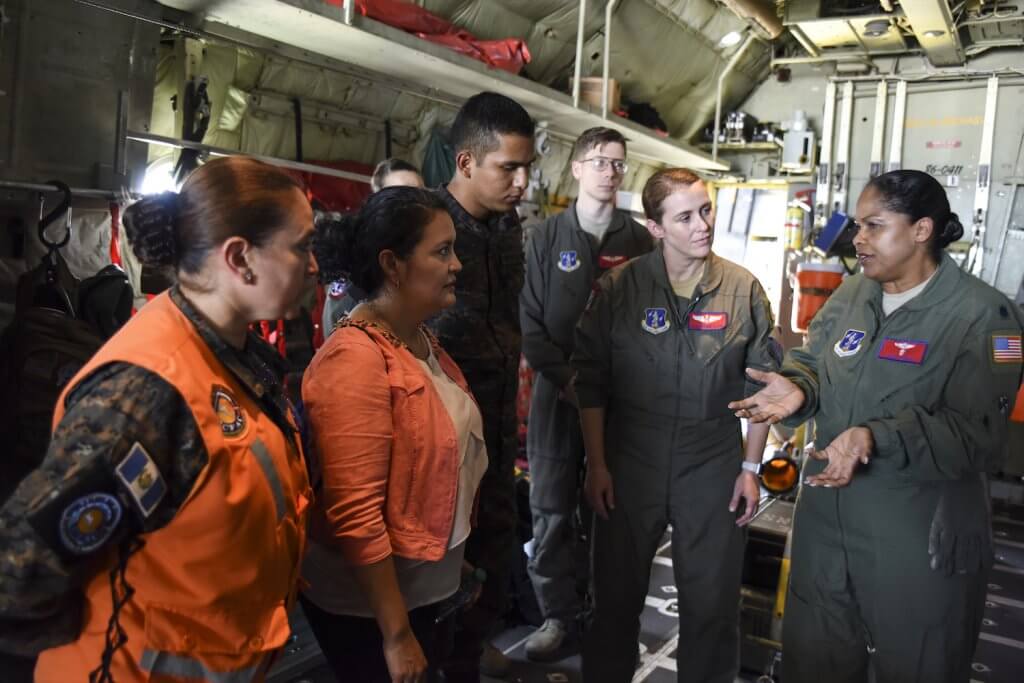When Guatemalan army leaders saw how well American noncommissioned officers work with enlisted soldiers and airmen, the Guatemalans knew exactly what to do: ask the Arkansas National Guard for support.
That request is rooted in relationship: the Arkansas unit first engaged with the Central American country in 2002 through the State Partnership Program. The SPP, a Department of Defense effort funded by Congress, stimulates global security through U.S. cooperation with other countries.
“That’s the Arkansas Guard being part of a big mission,” said Maj. Alex Saenz, Arkansas National Guard.
The unit’s regional training institute shares NCO curriculum and coursework and spends about three months a year with the Guatemalans.
Generally, the SPP improves the readiness, recruitment and retention of National Guard units, according to Lt. Col. Dan Cooper, of the Kentucky National Guard. The Bluegrass State’s unit first connected with Ecuador’s army in 1996. Since then, he said, Kentucky and Ecuadorian forces have assisted each other to gain practical experience in military skills or disaster preparations.
“We learn all the time,” Cooper said.
Many soldiers and airmen desire to travel, Cooper said. However, deploying to other nations is less likely now than it was even a few years ago due to the U.S. withdrawal from Afghanistan. Therefore, SPP participants have another opportunity for serving outside the U.S.
For example, Kentucky’s commitment to Ecuador includes thousands of soldiers who built schools and clinics and offered medical care, according to Kentucky National Guard Command Historian Andrew Dickson.
In the partnership’s earliest days, Maj. Robert S. Hacker was the administrative officer for the 201st Engineer Battalion of the Kentucky Army National Guard. He spent nearly five months in Ecuador before he died in a car accident in July 1998. Two years later, the Guatemalan people named a school after Hacker, according to The Bluegrass Guard, a unit publication.
Trips to Ecuador, even with the 1998 tragedy, gradually formed a natural fit for partnership between the country and Kentucky’s unit, Dickson said. Personal connections, such as those during Hacker’s trip, and shared concerns about earthquake disasters made ever-deeper interactions possible.
“It [also] keeps national guardsmen ready for a wartime force and a peacetime force with peacetime skills,” Dickson said.
Engineers from the Louisiana National Guard generated another benefit with their Central America partnership when they traveled to Haiti with Belizean defense forces, Chief Warrant Officer Allen West said. The two militaries sent personnel to Haiti in 2010 after a massive earthquake.
RELATED: Czech Republic hits milestone with Nebraska, Texas National Guard
During that trip, West said, Haitian military leaders asked the Belizeans about their collaboration with Americans. The Belizeans’ experience motivated the Haitians to join the SPP. So, in 2011, the Louisiana National Guard officially became Haiti’s partner.
“That was a real big accomplishment,” West said.
The utility of the $40 million DOD program has spread since it started with three nations who left the Soviet Bloc more than 25 years ago. Now, nearly half of the world’s militaries learn alongside National Guard units from 54 U.S. states and territories.
West and Lt. Emily Tran traveled to Belize in September during the country’s independence celebrations. The trip to Central America included a force resiliency exchange so Tran and Belizean military leaders could candidly share best practices for overcoming threats to soldiers’ well-being.
“It’s a mutually beneficial relationship,” she said.
SPP engagements around the world have strategically addressed cybersecurity risks; construction projects and building techniques; military professionalism; and counter-drug trafficking. In addition, units help nations with infantry or officer training, the restoration of air forces and sustaining service member welfare.
“The biggest benefit is it creates that partnership” between countries and National Guard units, according to Saenz.
“It creates trust in the U.S.,” Saenz said.
Moreover, the SPP coordinator said men and women in the Arkansas National Guard gain career benefits when they collaborate with Guatemalans.
“It’s something out of the ordinary for the soldiers and airmen,” Saenz said of SPP opportunities. “It gives them experience and a different level of accomplishment in their careers.”

